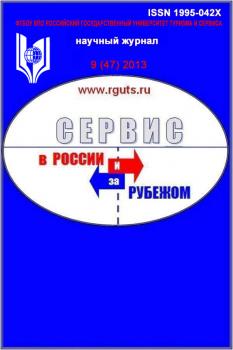Today, the attractiveness of the tourist market is characterized by the speed and rate of growth of its volumes. Strategic tourism development and the formation of appropriate strategies should aim to ensure the possibility of rapid promotion of tourist services in the tourist market, with varying degrees of development (growing, developing and developed). The rationale for this view of the development of tourism necessitates the use of different approaches, and especially the formation and development of tourist complexes and clusters based on tourism resources, the set of objects of tourist infrastructure, functionally and organizationally linked together. However, many theorists and practitioners in their scientific, methodological and practical activities use various treatments, such as "tourist complex" and "tourism cluster". Most experts identify these two concepts. Experts in the field of tourism methodology suggest the complexity of the construction of tourism clusters and the use of the cluster approach in the creation of tourist complexes. So are these concepts similar? Maybe they have the same meaning? Or do the main differences relate to practice? Or, conversely, from the standpoint of practice are they the same thing? Are there any differences, and if so, what they are? It should be noted that all these issues need to be clarified in relation to the main differences and similarities of the concepts, values and practical significance of these terms. The authors of the present article made an attempt to identify common features and main differences between tourist complexes and clusters. In our view, the problem of identifying these terms ("complex" and "clusters") today exists not only in tourism.
tourist complex, tourist cluster, development of the territory, region, tourist product, tourist service.
1. FTsP «Razvitie vnutrennego i v"ezdnogo turizma v RF na 2011-2018 gody» [Federal Target Program "Development of domestic and inbound tourism in the Russian Federation for 2011-2018"]. [Elektronnyi resurs]: URL: http://fcp.economy.gov.ru/cgi-bin/cis/fcp.cgi/Fcp/ViewFcp/View/2012/361 (data obrashcheniia: 10.11.2014) [Accessed on November 10, 2014].
2. Arutiunov, Iu. A. Finansovyi menedzhment [Financial Management]. - M.: KnoRus, 2010.
3. Vinogradova, M.V. Strategicheskoe upravlenie regional´nym turistskim kompleksom [Strategic management of the regional tourist complex]: monografiia. - M.: IKTs «Dashkov i K», 2009.
4. Kvartal´nov, V.A. Strategicheskii menedzhment v turizme: sovremennyi opyt upravleniia [Strategic management in tourism: modern management experience]. - M.: Finansy i statistika, 2009.
5. Kozlovskaia, O.V., Akerman, E.N. Osobennosti innovatsionnoi konkurentsii v usloviiakh globalizatsii [Features of an innovative competition in the context of globalization] // Vestnik Tomskogo gosudarstvennogo universiteta. - Sektsiia «Ekonomika». - 2010. - №2(10). -12 p.
6. Porter, M.E. Mezhdunarodnaia konkurentsiia. Konkurentosposobnost´ regionov: teoretiko-prikladnye aspekty [International competition. Competitiveness of regions: theoretical and applied aspects]. -M.: TEIS, 2003.
7. Shastitko, A.E. Novaia institutsional´naia ekonomicheskaia teoriia [New Institutional Economic Theory]. -M.: TEIS, 2010.
8. Ul´ianchenko, L.A. Prikladnye aspekty sozdaniia turistskogo klastera [Applied aspects of creating tourism cluster]. // Rossiiskaia ekonomika: tendentsii i perspektivy: sb. nauch. trudov. - M., 2012. - Vyp. 23.
9. Ul´ianchenko, L.A. Spetsifika produkta turistskogo klastera [Specificity of the product of the tourist cluster] // Razvitie turistskogo biznesa v regionakh Rossii: sb. nauch. trudov. - M.: Tekhnoprofkonsalt, 2012. - Vyp. 4.





